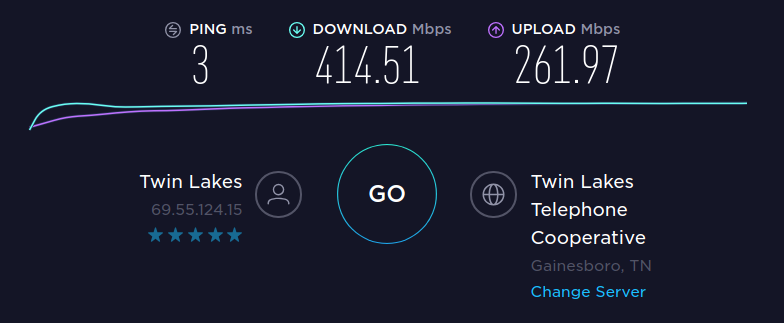cageymaru
Fully [H]
- Joined
- Apr 10, 2003
- Messages
- 22,074
The U.S. government has released its American Broadband Initiative Milestones Report that documents the reasoning, challenges, and necessity for broadband internet access and coverage across all of America. Digital technologies have fundamentally changed and created new business models since the rapid growth of internet access began in the 1990's. All jobs have been altered by digital technologies from agriculture to healthcare. Yet many communities and businesses across America are without access to this basic tool of modern economic prosperity. The U.S. government outlined three actions to be taken to bring about change: Invest $600 million in rural broadband while maximizing the value of taxpayer dollars. Use Federal land and towers through the Department of the Interior (DOI) for communications use. Last of all, create tools to identify and expedite Federal funding for priority markets.
24 million Americans lack access to fixed land-based 25 Mbps/3 Mbps broadband internet. 30% of Americans living in rural America and more than 35% of residents in Tribal lands lack access to basic broadband internet. 39% of rural Americans lack access to sufficient broadband internet access. Rural America covers 72 percent of the Nation's land and includes 46 million people. The report blames the lower population density in rural areas for increasing the "unit cost" or cost per person served. This makes erecting the broadband infrastructure more costly as more infrastructure is needed to cover large areas and causes the price of services for the rural population to be higher. The report suggests allowing the private sector access to towers on military, Department of Defense, Department of the Interior, and thousands of other government properties to build the broadband infrastructure on. There is a call to streamline policies and forms to make permitting processes faster.
Some suggest studying the feasibility of leasing Department of Energy Dark Fiber; unused fiber-optic cable, to the private sector. The government builds more network capability than it needs to curb the cost of having to expand and redo it in the future. Thus the unused lines are called "Dark Fiber." The report outlines the necessity of enhanced security measures for the proposed broadband initiative to protect consumer's sensitive personal, financial and health information and lower the cost of having to retrofit at a later date. The report also recognizes the propensity for false data coverage maps to be created because if one household in a census block has access to broadband internet; that area is usually listed as having "coverage" even though none of the other citizens living in the area have broadband internet access.
"In today's information-driven global economy, e-connectivity is not simply an amenity - it has become essential. E-connectivity, or electronic connectivity, is more than just connecting households, schools, and healthcare centers to each other as well as the rest of the world through high-speed internet. It is also a tool that enables increased productivity for farms, factories, forests, mining, and small businesses. E-connectivity is fundamental for economic development, innovation, advancements in technology, workforce readiness, and an improved quality of life. Reliable and affordable high-speed internet connectivity will transform rural America as a key catalyst for prosperity."
-- Sonny Perdue, Secretary of Agriculture, October 21, 2017
24 million Americans lack access to fixed land-based 25 Mbps/3 Mbps broadband internet. 30% of Americans living in rural America and more than 35% of residents in Tribal lands lack access to basic broadband internet. 39% of rural Americans lack access to sufficient broadband internet access. Rural America covers 72 percent of the Nation's land and includes 46 million people. The report blames the lower population density in rural areas for increasing the "unit cost" or cost per person served. This makes erecting the broadband infrastructure more costly as more infrastructure is needed to cover large areas and causes the price of services for the rural population to be higher. The report suggests allowing the private sector access to towers on military, Department of Defense, Department of the Interior, and thousands of other government properties to build the broadband infrastructure on. There is a call to streamline policies and forms to make permitting processes faster.
Some suggest studying the feasibility of leasing Department of Energy Dark Fiber; unused fiber-optic cable, to the private sector. The government builds more network capability than it needs to curb the cost of having to expand and redo it in the future. Thus the unused lines are called "Dark Fiber." The report outlines the necessity of enhanced security measures for the proposed broadband initiative to protect consumer's sensitive personal, financial and health information and lower the cost of having to retrofit at a later date. The report also recognizes the propensity for false data coverage maps to be created because if one household in a census block has access to broadband internet; that area is usually listed as having "coverage" even though none of the other citizens living in the area have broadband internet access.
"In today's information-driven global economy, e-connectivity is not simply an amenity - it has become essential. E-connectivity, or electronic connectivity, is more than just connecting households, schools, and healthcare centers to each other as well as the rest of the world through high-speed internet. It is also a tool that enables increased productivity for farms, factories, forests, mining, and small businesses. E-connectivity is fundamental for economic development, innovation, advancements in technology, workforce readiness, and an improved quality of life. Reliable and affordable high-speed internet connectivity will transform rural America as a key catalyst for prosperity."
-- Sonny Perdue, Secretary of Agriculture, October 21, 2017
![[H]ard|Forum](/styles/hardforum/xenforo/logo_dark.png)
